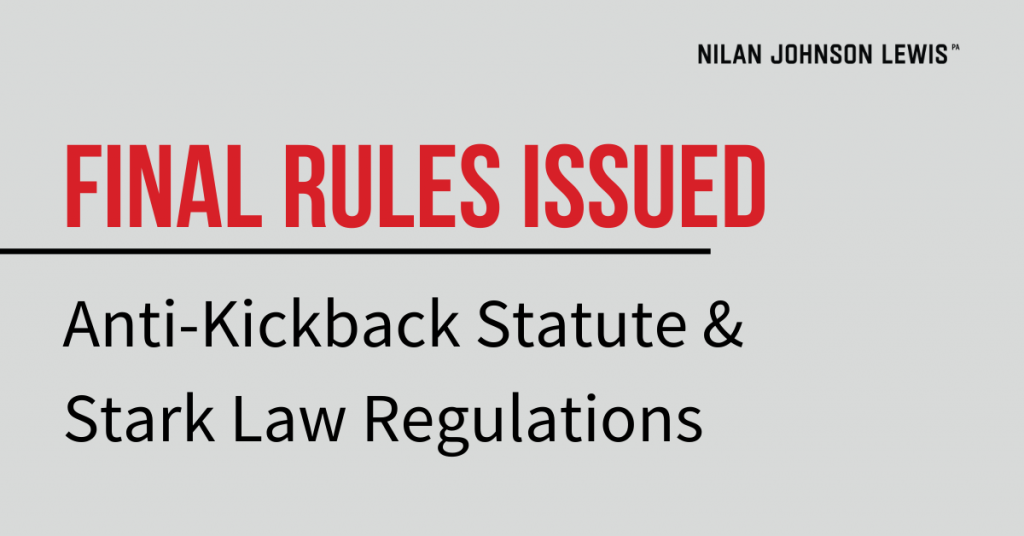
Posted November 25th, 2020 in Top Stories, Legal Insights
Anti-Kickback Statute and Stark Law Regulations: Final Rules Issued
On November 20, 2020, the Department of Health and Human Services (HHS) published two final rules that aim to reduce regulatory barriers to care coordination and accelerate the transformation of the healthcare system to value-based care. The HHS Office of Inspector General (OIG) issued the final rule “Revisions to the Safe Harbors Under the Anti-Kickback Statute and Civil Monetary Penalty Rules Regarding Beneficiary Inducements,” and the Centers for Medicare and Medicaid Services (CMS) issued the final rule “Modernizing and Clarifying the Physician Self-Referral Regulations.” The regulations are effective on January 19, 2021.*
Both final rules are extensive and we plan to provide further analysis on different sections. Here, we examine one of the three new safe harbors for value-based arrangements under the Anti-Kickback Statute.
New Safe Harbor Under Anti-Kickback Statute: Care Coordination Arrangements
Previously, the Anti-Kickback Statute was seen as a potential regulatory barrier for health care providers wanting to engage in certain care coordination and value-based arrangements. The new care coordination safe harbor (42 CFR § 1001.952(ee)) is part of HHS’ Regulatory Sprint to Coordinated Care, removing potential regulatory barriers and allowing providers to engage with each other to improve quality, health outcomes, and efficiency. It protects only in-kind remuneration (non-monetary) and requires little or no assumption of risk. [For those arrangements involving monetary remuneration, such as shared savings or performance bonus payments, the OIG designed new safe harbors for value-based arrangements with substantial assumption of risk.] One exclusive aspect of the care coordination arrangements safe harbor is that it protects digital technology arrangements involving manufacturers of devices or medical supplies and durable medical equipment (DMEPOS) if certain requirements are met. The other new value-based safe harbors deem such entities ineligible for safe harbor protection.
The new safe harbor offers health care providers an additional option under regulatory standards as they contemplate care coordination arrangements. Under the care coordination arrangements safe harbor, “remuneration” does not include the exchange of anything of value between a Value-Based Enterprise (definition provided below in the chart) and a Value-Based Enterprise participant, or between Value-Based Enterprise participants, pursuant to a value-based arrangement if thirteen standards are met as follows:
- In-kind remuneration being used predominantly to engage in value-based activities that are directly connected to the coordination and management of care for a target patient population;
- Commercial reasonableness;
- Terms set forth in writing and signed by the parties in advance;
- Establishment of one or more legitimate outcomes or process measures;
- Remuneration does not take into account the volume or value of referrals who are not part of the target patient population or business not covered under the value-based arrangement;
- Recipient pays at least 15% of the offeror’s cost for the remuneration;
- Does not limit a Value-Based Enterprise participant’s ability to make decisions in the best interest of its patients and does not direct or restrict referrals to a particular provider if a patient expresses a preference;
- Exchange of remuneration by a limited technology participant and another Value-Based Enterprise participant or the Value-Based Enterprise must not be conditioned on any recipient’s exclusive use or minimum purchase of any item or service manufactured, distributed, or sold by the limited technology participant;
- Monitoring and assessment to the Value-Based Enterprise’s accountable body or responsible person;
- Material deficiencies identified from the monitoring and assessment must be addressed within 60 days by either terminating the arrangement or a corrective action plan designed to remedy the deficiencies within 120 days;
- The offeror does not and should not know that the remuneration is likely to be diverted, resold, or used by the recipient for an unlawful purpose;
- Records retention period of at least 6 years for the Value-Based Enterprise or participant; and
- Certain entities are ineligible such as a pharmaceutical manufacturer, distributor or wholesaler; pharmacy benefit manager; laboratory company; pharmacy, but does allow a limited technology participant involving manufacturers of devices or medical supplies and DMEPOS.
Embedded within the new safe harbor’s thirteen standards are the following terms and definitions specifically issued for the new value-based arrangement safe harbors.
*Except for the special rules on profit shares and productivity bonuses at section 411.352(i), which is effective January 1, 2022.

